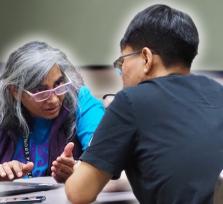The end of the year is a perfect time to take stock of your job — and your career
Do you look forward to arriving at work every day? What kinds of changes might improve your outlook? These may seem like simple questions, but if you dig just a little deeper, the answers could lead you to a more fulfilling work life. Occupational experts say the end of the year is a great time for a career assessment.
So what’s a career assessment, why do it, and how does it work?
“A career assessment touches upon a number of key factors, including your personality, your interests, what you value the most in your work, and what fulfills you,” explains Cynthia Marco Scanlon, a licensed professional clinical counselor with a specialty in career counseling. “I encourage people to think of it as a checkup. You may think you’re happy enough in your job, but are there certain things nagging at you, like a job responsibility you really don’t like or a boss who isn’t giving you clear direction?” Taking stock is important because if you catch an issue early, you can address it before grows into a bigger problem down the road.
“It can be reassuring to have confirmation of the factors that are a fit for you, and it’s also helpful to gain clarity about aspects of your job that you may want to change,” continues Scanlon, who’s also director of credentialing and special programs for the National Career Development Association (NCDA). She and other experts say that after an assessment, people are sometimes motivated to talk with their boss about something they want to change, whether it’s work hours, the number of meetings scheduled, or a more serious matter. Once in a while, people decide to make a bigger shift, such as pursuing a different position with the same employer or even a different career. (After all, most people change jobs up to 12 times in a lifetime, and spend an average of 4.2 years in each role.)
Getting started with your assessment is easy. “I suggest a list of pros and cons to begin with,” advises Anna Bray, a certified career coach with Jody Michael Associates. “Ask yourself what you like or love about your job, and what you don’t. Your list usually points to other important questions: What are your skills and abilities? What do you value? What kind of work — and work environment — suits your personality? What are your goals?” Your assessment might even involve an inventory such as the Myers-Briggs, which highlights personal attributes that impact your work. Perhaps you’re introverted, but your job entails large-group interactions that wear you down. Or maybe you spend a lot of time coding, but you’re an extrovert and would love more “people time.”
Don’t forget to take stock of what you get paid. For some people, being compensated highly is a value; for others, it’s a goal with specific numbers attached. Whatever it means for you, you may emerge from your assessment inspired to take action — whether it’s going after a raise, completing a certification to boost your earning power, or pursuing a higher-paying role.
Here’s a summary of the key notes to hit in your annual career assessment:
What to Assess
- Pros and cons. What do you like, love, or dislike about your job? Make an honest list and consider how to build on the pros and whittle away at the cons.
- Skills and abilities. You know your strengths. Do they match up with your job responsibilities? (Hint: having an interest in something is different from being good at it.)
- Personality. Are you introverted or extroverted? Do you go with your gut or the data? Do you follow your heart or logic? Are you a “decider,” or do you waver? The answers will help explain how you perform in certain situations.
- Values and priorities. Is your work a good fit with what’s important to you? Does the work environment reflect your values? The answers matter.
- Goals. Set them and keep track! Are you meeting yours? If not, what’s in the way? Assess and take charge.

Tracy Monteith, Eastern Band Cherokee, is a senior software engineer at Microsoft and an AISES Sequoyah Fellow. Here he shares a few insights based on his own career assessment experience and offers tips for other professionals who might be considering doing something similar.
What did your career assessment involve?
I solicited a career coach for an assessment of my LinkedIn profile, CV, and resume, as well as online search results related to me and my work and two verbal interviews. By leveraging my professional network, I was able to find a recently retired HR professional in my industry to do the assessment.
Did this exercise provide any insights or spur a change in course?
The assessment provided some guidance on the way my background and qualifications were portrayed and prioritized. While I made some immediate changes, including to my resume and LinkedIn profile, the more valuable insights will be leveraged in the next two to three years. The focus going forward is to align better with my unique value and passion. The greater knowledge gained involved the realization that my most important and uniquely valuable work was done outside my day job and includes so-called passion projects.
Is setting aside time once a year to take stock of your job/career path sufficient, or should it be done more/less frequently?
If you are new to career counseling, consider paying more frequent attention. You want to create a framework of career analysis and determine where you currently align within that framework. Once you have a solid understanding of how, why, and where you want to apply your talents, you can make tweaks and tune-ups based on reassessments conducted less frequently at career milestones.
Have you taken advantage of any career-advancement resources offered by your employer?
Career resources within companies can be most valuable if you’re interested in staying within the company and know what kind of role you’re considering. It’s important to get information from external career counseling resource centers as well, since they might expose a broader opportunity portfolio from multiple industries.
What tips would you give to people who find themselves in a professional rut?
Over a lifetime of career choices, there can and will be ruts. They can act as gentle nudges and reminders to always stay prepared for a career change. I sampled many industries and a range of jobs before finding a career. Pursue side projects and hobbies because they often align with passions. All careers are built on hard work over time, so combining passion and career choice creates a virtuous cycle of motivation. Building networks and connections is another key to career success. Actively making and pursuing professional connections will help create more opportunities.
Do you have any additional comments regarding this topic?
This comes back to self-awareness and occasional assessments of where you are and where you want to go. When a job or role is not getting you closer to where you want to be, consider making a change and placing a higher value on achieving your goal.














